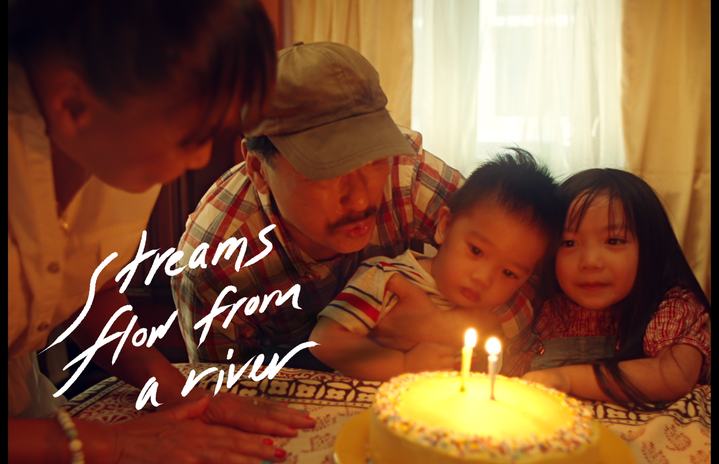From movies like “Crazy Rich Asians” to shows like “Kim’s Convenience,” Asian voices are boldly paving their way to the forefront of North American media. However, the voices of Asian-Canadians from rural towns have yet to be heard. Christopher Yip is an Alberta-raised Chinese-Canadian and creator of the poignant upcoming Web Series, “Streams Flow From A River.” Yip’s project is a slice-of-life examination of what happens when a snowstorm traps an avoidant family in a hometown they’ve outgrown. Sometimes, it takes an “act of God” to bring old wounds to new light. Since securing funding in 2021, the project has wrapped script development and will go into production mid-April, 2022. The writers of “Streams” share how their personal experiences have shaped the insights fuelling writers room conversations and how they hope to leave audiences feeling.
Where did the inspiration for the story of “Streams” first strike?
Chris: I left Edmonton to teach English in Japan for a few years, and while I was gone my grandfather had a stroke. I couldn’t come back at the time. But after three years, I saw my grandfather with my father, and there was a sense of loss. He’d lost the ability to speak, he was bedridden. But when I saw my father, his reaction was all classic-immigrant-Asian-dad: “Wow, Ye-ye looks so fat and healthy, look at his appetite.” I think when I was younger, I would have seen that perspective as cowardly, running from emotions, trying to hide. Now I know it’s just a different response. But that cultural gap between us, that generational gap in our response to trauma or pain, it’s stuck with me. I wanted to explore more, so I wrote a short film about it.
What inspired the cinematic tone of “Streams”?
Chris: Watching quiet, understated Asian cinema (Hirokazu Koreeda, Taiwanese New Wave)— especially after the Atlanta shootings and with the rise of anti-Asian hate— was very therapeutic in a lot of ways. It was comforting to see Asian faces on screen and just be connected with other people, especially during the pandemic. I identify so much more with Asian people in big cities, watching life happening. The scope and scale is very quiet, very subdued, but beautiful. So much is happening under the skin. After watching films like that, I was like, “This is the type of movie that I want to make.” I wanted to bring these kinds of sensibilities to Canadian cinema.
“Streams” is set in a rural Albertan town. How did you decide on that location?
Chris: Asian folks have been living in small rural towns in Canada forever, since they first came for the railroad; working at laundromats, liquor stores, convenience stores— and their story has never been told. I thought setting it in a small rural town speaks to the overbearing whiteness of growing up in a place like that. And I just wanted to tell a very grounded, quiet, tender family story.
How did you build your perspective on identity and relationship with family into “Streams”?
Chris: Building boundaries with your parents is so difficult. I felt under-equipped, especially when I left home. I fold to conflict so easily. And I feel like I had to create myself, or learn to be brave and fight and speak out. It makes sense, because of Confucianism family systems and stuff. It makes sense that those are trained into you, as a kid growing up. Also, it makes sense that my parents would cling to their culture so much and want to imbue this into their children. We needed to go to violin, Chinese school, every family dinner and pay respect to the elders. But that’s like a third of who we are; we’re figuring out our identity in real time.
What was your experience of the writers room for “Streams?”
Chris: It was very humbling to see the story improve in real time. People who brought their personal experiences to the room were so open about sharing. I was hearing other people pitch things that broke my heart. People sharing their talent in the room is amazing. I’m very excited for people to see the episodes from the people in the writers room. It’s so interesting to see this as work; you sit in a Zoom and talk about story for eight hours. As someone with the immigrant mentality… Like, getting paid for that? Are you serious? It’s great. Beats lugging 40 pound cans of Ramen soup up and down stairs. We got very vulnerable and it was very rewarding, but we had to pour into it. It was everything that I hoped it would be and more.
Marushka Almeida, a writer on “Streams,” shares their personal experience of the writer’s room
Marushka: I’ve never been in a room where I didn’t have to explain my immigrant parents. They all understood because everyone in that room had immigrant parents. It wasn’t even a room where I was the only one who immigrated to Canada, there was another immigrant in the room with me. That feeling of not having to constantly explain your identity lifts up so much and makes the room such a safe space. I talked about so many deep, personal experiences because of the safety and comfort of that room. Every plot and story that we came up with was so organic and built from all of our personal experiences. It was less like a room, more like therapy, I would say.
What do you want audiences to take away from “Streams Flow From A River”?
Marushka:
Know that whatever you see of Asian representation in comedies on screen— everyone is complicated, and everyone is nuanced. Sometimes I feel like we don’t afford that nuance to certain people of certain backgrounds. We try really hard to box them in. Sometimes we do it to our own parents, and our parents do it to us. We try to box the people in our lives and keep them from being the messy, complicated people that they are. I want people to take away from “Streams” that these are real human beings who have their own complicated lives and their own baggage that they’re dealing with. They’re human at the end of the day.
Christopher:
The series started as a family drama about an Asian family because I wanted to see that myself, and I thought it was so important for our parents and working class Asians to see themselves represented. I felt like it was so important for Asian folks to have the space to feel held. And in particular, for dads to be able to share their feelings and wounds; to let go of their anxieties and feel safe as well. I need Asian dads and moms to meet us halfway too.


